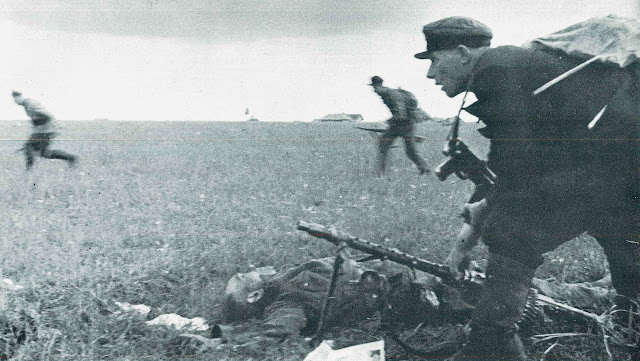On the Eastern Front of World War II, on the steppes of Belarus in April 1943, a Belarusian partisan takes a machine gun from the corpse of a fallen German soldier and charges him. The Soviet Union's Great Patriotic War of 1941-1945 on the Eastern Front of World War II claimed the lives and mutilated the bodies of countless others, leaving a tragic toll and mark on millions of people.
Partisan resistance movements covered almost all fronts and occupied territories from the beginning of the German invasion of Soviet territory. The partisan resistance movement operated from the beginning of the German offensive with irregular units composed of civilian militias. Partisans, who engaged in special guerrilla activities, fought on steppes where there was little or no forest. All partisan detachments retreated with Red Army units when the Germans approached and were incorporated into regular units by early November 1941. Partisans with inadequate military training, older age, and weaker armament had little chance of surviving the battle with the Germans. On a small island in the forested area of the Krasnolimansk district, the Artemovsk partisans were surrounded by German troops and wiped out.
Belarusian partisans during World War II opposed the Germans from 1941 to 1944. Belarus was one of the Soviet republics occupied by the Germans during Operation Barbarossa. The Belarusian partisans suggested not only the irregular forces of the Soviet formation, but also Jewish groups, Polish groups, and nationalist Belarusian forces opposed to Germany, who also fought as guerrillas at the time. The Belarusian partisans heard Stalin's report and the October 1942 order. With great excitement the Belarusian partisans listened to Stalin's report and his October order, as conveyed over the radio. Meetings were held in many partisan detachments. At the detachment meetings the partisans vowed to fulfill Stalin's orders. Stronger and more ruthless, the partisans of all detachments were unanimously enthusiastic about defeating the German invaders.




No comments:
Post a Comment